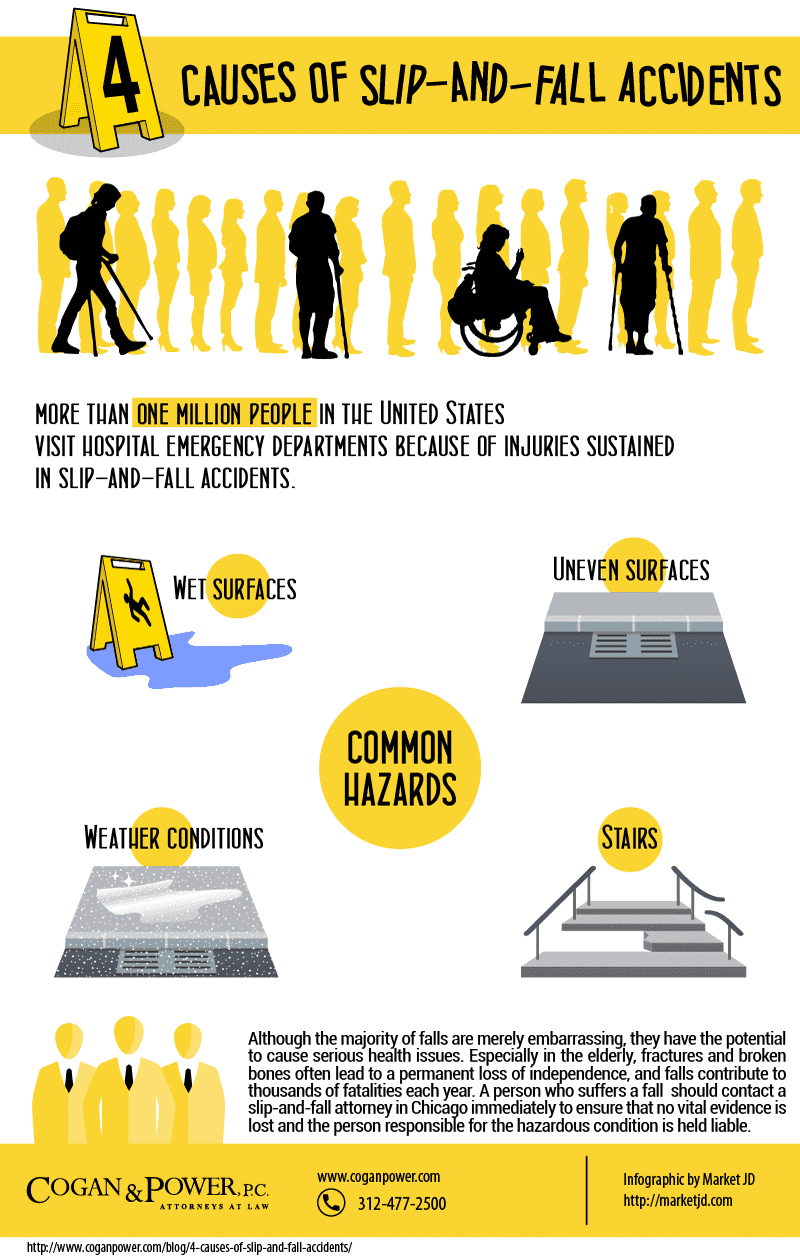In DuPage County, Illinois, a woman recently filed a lawsuit against a popular chain restaurant, TGI Fridays, when she allegedly slipped on a puddle of liquid on the floor, according to Patch Network. The fall caused extensive injuries, she claims, and she is now seeking compensation for medical costs. Any slip-and-fall attorney Chicago knows that medical costs for these types of accidents can quickly build, putting victims into financial hardships.
(article continues below infographic)

The National Floor Safety Institute reports that more than one million people in the United States visit hospital emergency departments because of injuries sustained in slip-and-fall accidents. A fall may cause broken bones or sprains, torn ligaments, or a traumatic brain injury. Individuals should be aware of floor or ground conditions to identify and avoid common hazards.
- Wet surfaces
Standing water or oily substances, food debris and recently waxed or polished floors are frequently the source of wet surfaces, according to any slip-and-fall attorney in Chicago. Some areas, such as grocery store produce aisles, are subject to overspray and drips, and these areas should always have protective mats and warning signs alerting the public to the danger.
- Uneven surfaces
A slight change in elevation can create a hazard on a floor or outdoor surface. Loose floorboards or tiles, cracked sidewalks, holes, torn carpeting and unexpected steps up or down often cause falls. It is the responsibility of property owners to identify any uneven surfaces and take steps to warn visitors and guests of their presence.
- Weather conditions
Streets, sidewalks and parking lots are affected by weather conditions, and rain, ice sleet and snow frequently cause conditions that lead to falls. When individuals carry moisture indoors on shoes, clothes and umbrellas, the problem is compounded.
- Stairs
Stairs provide a multitude of opportunities for dangerous conditions. Loose handrails, worn steps, cracked or splintered boards and poor traction are all common hazards. Poor lighting or especially steep steps may also contribute to accidents.
Premises liability is the legal theory that property owners and residents are responsible for accidents that occur on their property. If the owner of the property knows about the hazard but does not take action to remove it in a timely manner, or if a reasonable person would have been aware of it, the owner may be held liable. In some instances, a landlord may be responsible for the cause of an accident, such as a poorly maintained floor or sidewalk. A manager or third party may also be liable if the incident involves a spill, or negligent cleaning behaviors that lead a hazardous condition.
Although the majority of falls are merely embarrassing, they have the potential to cause serious health issues. Especially in the elderly, fractures and broken bones often lead to a permanent loss of independence, and falls contribute to thousands of fatalities each year. A person who suffers a fall should contact a slip-and-fall attorney in Chicago immediately to ensure that no vital evidence is lost and the person responsible for the hazardous condition is held liable.
